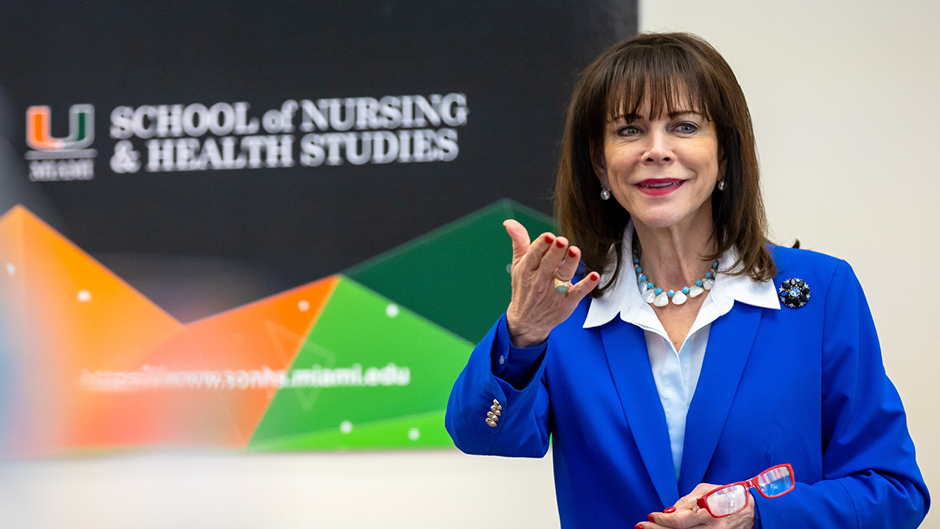The University of Miami School of Nursing and Health Studies (SONHS) recently hosted a special event to bring the widespread crime of human trafficking to the forefront of health education. First on the agenda was “Combating Human Trafficking: A Talk with Katherine Fernandez Rundle” during which the long-time Miami-Dade State Attorney detailed the harsh realities of human trafficking in South Florida, an epicenter for this modern slavery epidemic. Fernandez Rundle also highlighted her office’s public awareness campaign, including a new hotline at 305-FIX-STOP, and its prosecution efforts since 2012, which have resulted in her team working with over 700 human trafficking victims and filing over 600 cases.
After Fernandez Rundle’s January 14 presentation, SONHS Dean Cindy L. Munro, PhD, RN, ANP-BC, FAAN, FAANP, FAAAS, explained that SONHS is doing its part as well. “Every nurse needs to have the ability to respond in an appropriate way to someone in trouble,” said Dean Munro, noting that the Florida Board of Nursing now requires continuing education on the topic of human trafficking. Munro said SONHS is raising the bar on such education by working with stakeholders to create a simulation-based curriculum that addresses in real-time the complexities health providers face in recognizing and responding to patients enslaved by traffickers.
To illustrate her point, Munro led SONHS visitors, including Fernandez Rundle, to the school’s Simulation Hospital Emergency Department (ED) to observe a simulated scenario: A “patient” being trafficked by her “boyfriend” grows increasingly agitated after being transported to the ED against her will while unconscious. The nurse practitioner on duty (a current SONHS student) is suddenly faced with assessing a scared and uncooperative patient in real danger of further harm. (Munro emphasized that to avoid re-traumatization, only specially trained standardized patients must portray the human trafficking victims in such scenarios, never human trafficking survivors themselves.)
The scenario depicted represents an ongoing collaboration between SONHS Assistant Professor of Clinical Susana Barroso-Fernandez, PhD ’16, RN, director of Simulation Hospital Special Projects, and JoNell Potter, PhD ’03. MSN ’87, a SONHS double alumna who runs the THRIVE (Trafficking Healthcare Resources and Interdisciplinary Victim Services and Education) clinic at the Miller School of Medicine.
In February, SONHS will host two more events showcasing how simulation-based education is being used to help combat human trafficking on the front lines of care. To attend the upcoming Human Trafficking Awareness Summit at SONHS, please RSVP to sbarroso@miami.edu.
To report suspected human trafficking activity, call the Human Trafficking Miami Hotline at 305-FIX-STOP, the Florida Department of Children and Families abuse hotline at 1-800-96-ABUSE, or the National Human Trafficking Hotline at 1-888-373-7888. For emergencies, dial 911.



